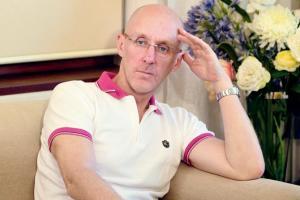London suicide prevention expert and educator on breaking the shame and stigma associated with this daunting subject

Nick Barnes says we need to have conversations about suicid
Nick Barnes, developer of the UK's national qualification in suicide prevention, and founder and CEO of National Centre for Suicide Prevention Education UK, is in Mumbai to conduct a series of workshops for laypersons on suicide intervention, prevention and education. The London-based professional is on his first visit to India, on invitation from Safe Space, a Mumbai organisation working in the field of suicide prevention.
Barnes first cautioned as a start note in this interview conducted on a free day between his Mumbai workshops, "There are certain guidelines that one should go by when reporting about suicide, and the first is desisting from publicising the 'means' of suicide about 'how' somebody died by suicide." Sunbeams glanced off the waters at Worli Sea Face, visible through the big windows of the home, which was venue for this interview. The sunshine was in contrast to what is perceived as the dark subject of suicide.
The pain
Barnes preferred to use the word daunting. "In any culture, a subject like suicide is daunting. Even clinicians (doctors, psychologists, nurses, paramedics) are not trained in having conversations about suicide. Yet, we need to have this difficult conversation," he said. Some of the cornerstones of suicide prevention said Barnes, are "to understand that those who talk about wanting to die by suicide, want the pain to stop. They do not want to end their lives. That is a core belief."
Using that belief as the basis, Barnes said, "It is important for ordinary persons to feel empowered enough to be able to intervene and prevent suicide. This is not as intimidating as it sounds. In these workshops, we are not concentrating on medical professionals but laypersons. We are teaching them soft skills. By soft skills I mean something like listening to another person."
At the equator, the speed of the Earth's spin is approximately 1,000 miles per hour (1,600 km per hour). In the rush of modern, urban living, it may seem that we are spinning faster than that, "and we never seem to listen to the other person," said Barnes. "When do we actually listen? We must, just enough so that we ourselves can ask a question," said Barnes, who emphasised that a person harbouring thoughts about suicide, "may hugely benefit by understanding and empathy. The realisation that somebody understands or feels what he is feeling is a huge gift for the person. Empathetic listening is a soft skill, and, when you learn that, when you work with these persons and connect with them, you create conditions of change and there is hope."
To talk
Barnes added, "part of the difficulty of having a conversation is that we have been conditioned all our lives to feel shame about suicide. It is illegal by law, considered a sin in certain faiths and that contributes hugely to the stigma around it. That is also why we are not talking about it. Thoughts of suicide though are part of the human condition. We have to acknowledge it and recognise it. We have to talk about pain relief, alternatives to suicide and focus on coping. We need to recognise and confront the horror, because if we do not, someone may die."
Insta age
Most of our responses to situations are now defined by social media, "and how we communicate has changed. Devices we hold in our palms have given us instant power and connect," said Barnes to a question about whether this generation is too quick to take the suicide route. He said, "Social media means instant power. The power to hurt or humiliate has increased dramatically. We have to think before we post and use social media with great responsibility. We have to also protect youngsters from online bullying. Youth are impulsive and tend to act and react very quickly."
The lingo
In the end, said Barnes, "Individuals and governments can take some measures with suicide prevention. We have to stop romanticising suicide by not focusing on the means or the way the person died. We have to change our lingo about suicide. Stop, for instance, writing or speaking like, he 'committed' suicide as you commit a crime, as you commit a murder. Suicide is not a crime and using a word like committed means associating suicide with those same things. Die by suicide is the way to put it. Governments must do their bit. One example of this is to build higher barriers, fencing or walls at 'suicide spots' to make it more difficult for a person to clamber up and jump off them. Even a few seconds of wait time, may be enough for somebody to re-think and stop himself from taking his life." Barnes, who labelled his visit and work in India as "ground breaking," said he hoped to make a follow up visit later in the year.
Catch up on all the latest Crime, National, International and Hatke news here. Also download the new mid-day Android and iOS apps to get latest updates
 Subscribe today by clicking the link and stay updated with the latest news!" Click here!
Subscribe today by clicking the link and stay updated with the latest news!" Click here!







